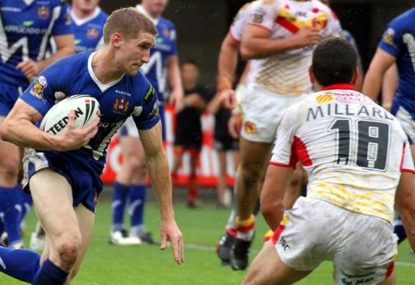It’s a throwaway line at the bottom of a rugby league story in The Australian and it seems to represent yet another embarrassing climb-down by a sport that just doesn’t know what to do with itself.
“The NRL has also reduced to two the number of clubs to play in next year’s World Club Challenge,” journalist Brent Read wrote.
(I’m not Brent Write, reading it, by the way.)
That’s a sentence that throws up a couple of questions, but neither of the answers makes for cheery reading.
Firstly, is that two NRL teams being sent to the tournament, or just two teams involved all up, in one game?
Secondly, how can the NRL make decisions on who competes in something that is also controlled by Super League?
The answer to the latter is obvious: the NRL has the bigger competition with the most money and all the glamour and can do what it damn-well likes.
The solution to the first question is merely a matter of degree in the failure of another ambitious rugby league concept that has been tried in so many forms, with nothing achieved but widespread dizziness from going around in circles.
The World Club Challenge, or Championship, started in 1976 and was played, er, one year in a row.
It was revived in 1987 and played every second year until 1991, with just two teams each time, before becoming annual until 1997 when it suddenly ballooned to 22 teams under the mistaken belief that full-scale international competition would take the sport to a new level.
It was a shambolic mismatch, to the extent that an undefeated southern hemisphere side was beaten to the finals by a northern hemisphere team that had not won a single match in the round robin, because the formula dictated a quota from each region qualified.
The final pitted Brisbane against the Hunter Mariners, who ceased to exist at full-time in the match.
So we abandoned the concept again for two years and in 2000 it returned as one game played annually. In 2014, however, St George Illawarra and Brisbane were convinced to join South Sydney in the UK.
The coalition of the willing got so much out of the trek, despite all Super League sides losing, that this year we actually managed to convince the top three NRL teams from the previous season to be involved.
A rare, rate piece of tangible progress. We were informed that ten of the 16 Australasian teams wanted to be involved.
Oh no. As in 1997, they proved far too good. Sydney Roosters beat St Helens 38-12, Brisbane downed Wigan 42-12 and North Queensland blitzed Leeds 38-4.
So we’ve given up again, scaling it back to one or two games. Shane Richardson’s departure from League Central has clearly killed off a brief flirtation with international competition, at club and representative level.
The NRL is back to its default position – staring at its own navel.
The World Club Series was good for the game in England, attracting national publicity which is normally almost impossible to get. Who can forget the kerfuffle around Russell Crowe eschewing the Oscars to be at Langtree Park?
It also helped NRL clubs broaden their marketing bases, selling memberships and merchandise to the game’s other major outpost of support in the north of England.
But you know what? I’m going to take this column in a direction you probably don’t expect right now. I fear this might be the right decision from a practical perspective.
When the NFL wants to play games in London, they don’t take on the Coventry Jets or Sheffield Predators, do they? They play each other.
NRL teams now have twice the salary cap of their Super League cousins and the gap is only going to widen. Most Super League clubs cannot even afford to underwrite a World Club Challenge game (Huddersfield were reputedly uninterested this year) and it may be that with Leeds at the bottom of the table in 2016, the clubs up top just don’t have the cash to pay for the incoming travel.
One World Club Series/World Club Challenge game at least sets the stage for an upset – three just highlights the expanding gulf between the leagues.
The fears of Salford owner Marwan Koukash are legitimate – Super League is well on the way to becoming a feeder competition for the NRL.
Great Britain great Garry Schofield, talking on the Backchat TV program recently, said he’d be happy to see 50 or 60 Englishman make the move because winning at international level is so important.
What the NRL should be aiming to do is stage its own events in Britain, one of the only international outposts with a degree of wealth and a proven interest in the game. A full-scale NRL match at a soccer stadium would do well, building up to a State of Origin down the track.
Just because League Central has apparently given up on the World Club Challenge doesn’t mean it should give up on Britain.





























































































